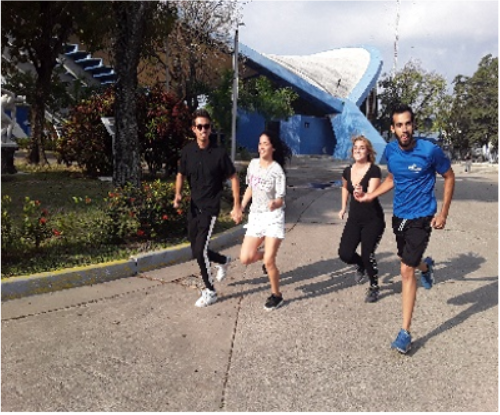Ecological race, initiative to contribute to environmental culture in university sports
Main Article Content
Abstract
Faced with the negative impacts of climate change, it is necessary to incorporate all sectors of society. Initiatives in the field of sport are still insufficient. The objective of the article is to assess the potential of the ecological race as a sports-recreational modality to contribute to an environmental culture in the university community. A bibliographic review and dialogue with users are combined, which endorse its possible contribution in the university to education for sustainable development and adaptation to climate change.
Downloads
Article Details

This work is licensed under a Creative Commons Attribution-NonCommercial 4.0 International License.
Those authors who have publications with this journal, accept the following terms of the license Attribution-NonCommercial 4.0 International (CC BY-NC 4.0):
You are free to:
Share — copy and redistribute the material in any medium or format
Adapt — remix, transform, and build upon the material
The licensor cannot revoke these freedoms as long as you follow the license terms.
Under the following terms:
Attribution — You must give appropriate credit, provide a link to the license, and indicate if changes were made. You may do so in any reasonable manner, but not in any way that suggests the licensor endorses you or your use.
NonCommercial — You may not use the material for commercial purposes.
No additional restrictions — You may not apply legal terms or technological measures that legally restrict others from doing anything the license permits.
Notices:
You do not have to comply with the license for elements of the material in the public domain or where your use is permitted by an applicable exception or limitation.
No warranties are given. The license may not give you all of the permissions necessary for your intended use. For example, other rights such as publicity, privacy, or moral rights may limit how you use the material.
References
Chaar, M (2012). Colônias de ferias integradas ao meio ambiente.despertando sentidos críticos e sustentáveis. Campinas, Sao Paulo Editora Alínea.
COI (1999). Manual de Deporte y Medio Ambiente (Vol. 1). Lausana, Suiza. Recuperado de :www.coc.org.co/sites/default/files/Deporte%20y%20Medio%20Ambiente%20-%20COI.pdf
Crispín, D (2010) Metodología para realizar caminatas ecoturísticas en la Isla de la Juventud: como recreación sana y sostenible aparece en Revista Acción electrónica. No.12, 44 - 49. Disponible en: http://accion.uccfd.cu/accion12.pdf [consultada el 12 de enero de 2021]
Gomes, C e Pinto, L (2009) O lazer no Brasil. Analisando praticas culturais, cotidianas e acadêmicas e políticas pág. 67-122 em Libro Lazer na America Latina/Tiempo libre, ócio y Recreación en Latinoamérica de Christianne Gomes, Esperanza Osorio, Leila Pinto, Rodrigo Elizalde (organizadores) Editora de la Universidade Federal de Minas Gerais (UFGM), Belo Horizonte pág. 67-122.
León Martínez, S (2013) Formación de promotores ambientales comunitarios para la Actividad física comunitaria. [Tesis en opción al grado científico de doctor en ciencias de la Cultura Física y el deporte]. UCCFD Manuel Fajardo.
Martí, J (1883) “El gimnasio en la casa” en Obras Completas tomo 8 p 389. Editorial Ciencias Sociales, La Habana 1991.
Redondo , ER ; Calle, F; Coronel, AR ;Valladares, FE (2020) Methodology to strengthen the environmental education in Athletics recuperado de http://podium.upr.edu.cu/index.php/podium/article/view/937
Pérez, A y León, S (2009) “Tiempo libre, actividad deportivo-recreativa y estilos de vida en Cuba“ en Libro Lazer na America Latina/Tiempo libre, ocio y recreación en Latinoamérica de Christianne Gomes, Esperanza Osorio, Leila Pinto, Rodrigo Elizalde (organizadores) Editora de la Universidad federal de Minas Gerais (UFGM), Belo Horizonte pág. 253-294
UNESCO (2019) Educación sobre el cambio climático disponible en climate_01.jpg en https://es.unesco.org/themes/educacion-desarrollo-sostenible/cambio-clima

